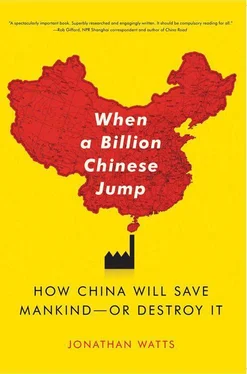22. He added, “When I started out in 1983, there was only one environmental law. It wasn’t even a real law. It was a pilot. Now there are twenty-five or more laws and hundreds of regulations. But the environment is still deteriorating.”
23. Only 4 out of 113 gave an adequate response, according to a survey carried out by Ma and leading academics (Jonathan Watts, “Local Governments Keep Chinese Public in the Dark about Pollution,” Guardian, September 4, 2009).
24. Ibid.
25. The NGO newsletter China Briefing, published by Briton Nick Young, was banned in 2007, partly because it linked disparate activist groups.
26. Zeng Jinyan (wife of Hu Jia), Xu Jiehua (wife of Wu Lihong), and Yuan Weijing (wife of Chen Guangcheng).
27. Similarly with Tan Zuoren and Chen Guangcheng. Tan won the approval of Premier Wen for his reports on dams and petrochemical plants in Sichuan. But he was arrested after he turned his attention to the shoddy school construction that led to the deaths of thousands of children in the 2008 earthquake. Chen started out by organizing a campaign to get clean drinking water in his home province of Shandong. Later, his exposure of brutal and illegal techniques to enforce the family-planning laws led to his being abducted from the streets of Beijing by plainclothes officials, put under house arrest, and later imprisoned. Others I met who were later locked up include Liu Xiaobo, Gao Zisheng, Sun Xiaodi, and Liu Jie.
28. Music charts in China are even less reliable as a guide to popularity than in the U.S. and Europe, not least because almost all music is pirated and downloaded for free. At a Climate Change gig at Mao Livehouse, for which he arrived onstage in a white biohazard suit and goggles, Xiao sang to acclaim:
When you’re young and
When you’re green
Save all the beautiful things
With pride and love we sing
“See we can show you!”
29. It occupied the top spot from December 8 to 14, 2008. Mongolian Cow (Mengniu) Sour Yogurt has a strong association with pop music. Super Girl or Super Voice Girls, the hugely popular Chinese version of The X Factor, is also sponsored by the Inner Mongolia–based firm.
30. This is an unusual but reasonable approach to easing the pressure on the planet. Eating vegetables directly is a far more efficient way to take in energy than consuming meat, which has to be fattened up with grain.
31. Several major NGOs told me they approached Chinese celebrities about fronting wildlife conservation activities, but were turned down so often they gave up.
32. The two are, of course, not mutually exclusive. The challenge is how to rebalance the relationship between man and nature.
33. “Eco-Civilization” research is apparently the new communist orthodoxy. The institute was set up after President Hu made it a key goal.
34. Few lives so vividly illustrated the turbulence that has racked China for the past sixty years. Jiang was born in 1946 in Jiangsu Province to a politically red-blooded family. His parents were former Red Army soldiers, heroes of the war against Japan, but his mother died young and his father was almost beaten to death during the Cultural Revolution as an accused “Black Gang Capitalist Roader.” Jiang was nevertheless completely enamored of Mao. He joined the student Red Guard and rose to become deputy head of the revolutionary core group in his college, the Beijing Academy of Fine Arts. He was sent to Inner Mongolia along with the wave of “educated youth” who went to the countryside in 1967, but the air of the steppe failed to soften his rebellious nature. Jiang was jailed for more than three years and narrowly escaped the death penalty for criticizing Communist Party number two Lin Biao in 1970 just before his demise. He founded the “Beijing Spring” reform publication during the Democracy Wall protests in 1978 and played a prominent role in the Tiananmen Square protests of 1989, for which he spent another eighteen months behind bars.
35. The economy is racing forward at the staggering rate of 38 percent a year. Local authorities expect the size of the economy to triple between 2007 and 2012. If their projections prove correct, Ordos is on course to be a wealthy megacity by 2020 (“Ordos: A Land of Opportunity,” China Daily, August 25, 2008). According to the Chinese Academy of Social Sciences, the city has the greatest growth potential in China.
36. “The World’s Largest Solar Plant Is Planned for the Mongolian Desert of China,” United Press International, September 10, 2009.
37. Interview with Sun Lixia, director of the Ordos eco-town project.
38. The pilot eco-town project covered forty-two buildings and fifty-five hectares in one of the city’s many new districts.
39. Or so he claimed. Some historians doubt that he ever made it to Kublai Khan’s palace.
40. His attempts to invade Japan and Vietnam ended in disaster. His open-minded view of philosophy closed when he turned against Taoism, ordering the burning of three-quarters of the sacred texts.
41. John Man, Xanadu (Bantam Press, 2009).
42. Nobody has ever offered a definitive interpretation of “Kubla Khan,” which might explain its enduring fascination. The wittiest comment on its inscrutability was offered by the Cambridge University lecturer George Watson, who noted that after millions of words of structural analysis, biographical investigation, and creative interpretation by the world’s leading scholars, “We now know almost everything about Coleridge’s ‘Kubla Khan’ except what the poem is about.” Coleridge himself dismissed the work as nonsense, a triumph of sound over sense.
43. These are the opening lines. I have reluctantly omitted the rest due to space limitations.
44. Coleridge was an opium addict. The addiction contributed to his death in 1834.
45. Anthropological examinations of successive generations of Mayan skeletons showed declining levels of nourishment as population density grew to a level similar to that of modern China and then collapsed (Donald Hughes, An Environmental History of the World: Humankind’s Changing Role in the Community of Life [Routledge, 2001], p. 46).
46. Ibid., p. 64.
47. Clive Ponting, A New Green History of the World (Penguin, 2007), pp. 3–6.
1. The earth’s population is 6.8 billion, average life expectancy is sixty-five years, and humans use or occupy 83 percent of the world’s land. The “human footprint” has been defined as “human land uses, human access from roads, railways, or major rivers, electrical infrastructure (indicated by lights detected at night), or direct occupancy by human beings at densities above 1 person per sq. km” (“Last of the Wild Project,” Center for International Earth Science Information Network [CIESIN], Earth Institute at Columbia University).
2. Evident during a 2009 visit to Beijing by House Speaker Nancy Pelosi, who refrained from repeating her previous outspoken criticism of China’s human rights record to emphasize that Beijing’s cooperation on climate change was vital.
3. In researching this book, I came across many suggestions for improving mankind’s eco-footprint. The principle of making polluters pay could be expanded to consumers by surcharging goods produced using unsustainable materials. Energy and water should be metered and priced to reflect their pollution costs and scarcity. Conversely, there should be incentives in the form of subsidies and lower taxes for “living lightly.” Education should emphasize sustainability, and far more information should be made available about air, water, and soil quality (by adding an environment forecast to the daily weather forecast, for example). Environment insurance companies could be nurtured to offset risk and champion strong precautionary measures. In the political sphere, there should be tighter central government control over regional environmental issues and more rigorous implementation of environmental legislation. More ambitiously, systems of governance could be reshaped to include a politically neutral chamber that represented the long-term interests of the earth rather than the short-term concerns of the electorate.
Читать дальше










